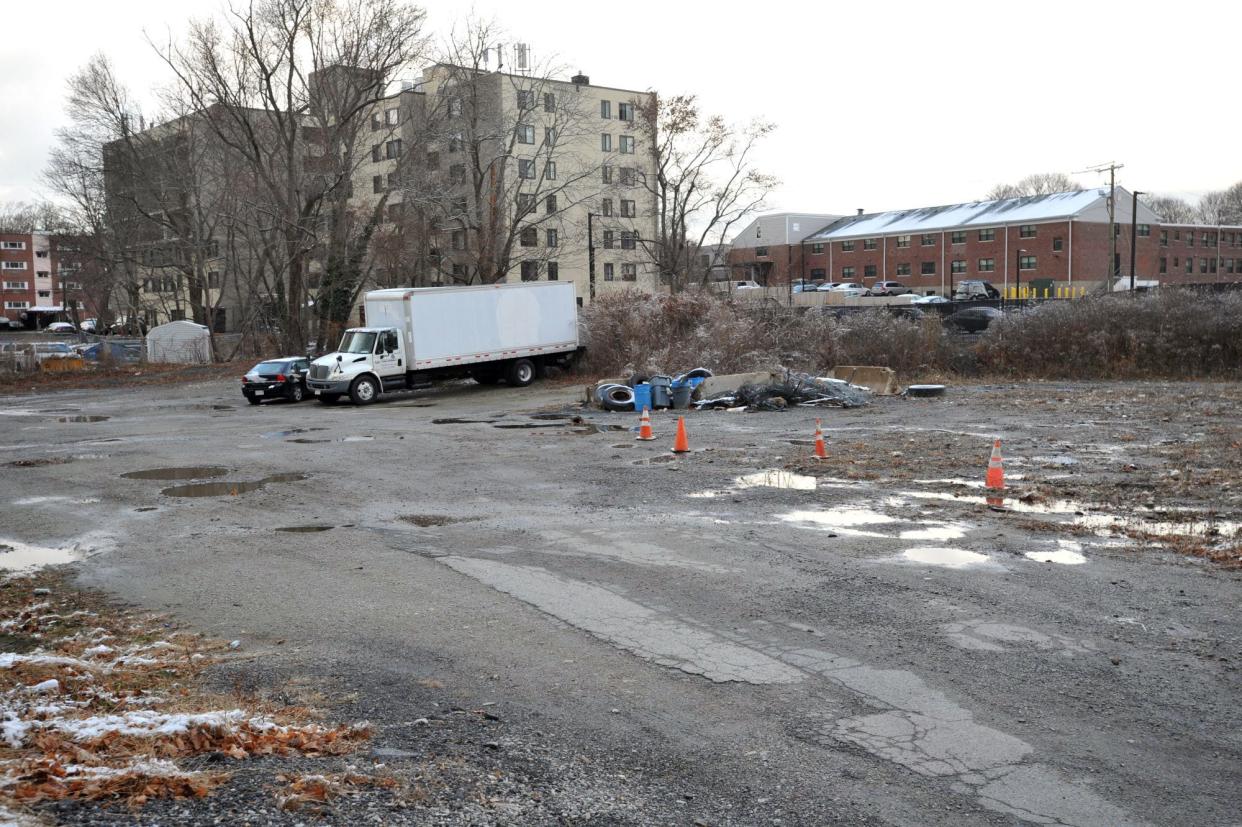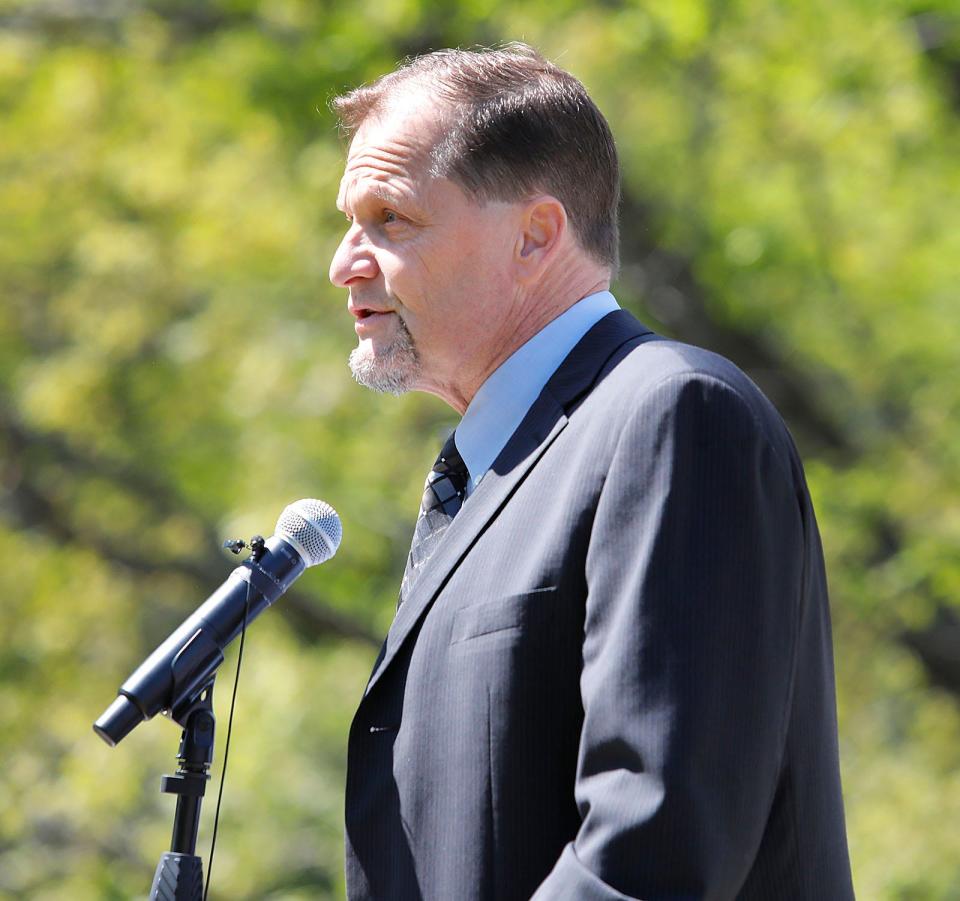A Weymouth mayoral veto is rare. And so is what happened afterward on this zoning decision

WEYMOUTH − A mayor’s veto of a town council decision is fairly rare in Weymouth. But whenever such disagreement arises between the town’s chief executive and legislative body, members of the town council can discuss the veto and vote with a two-thirds majority to override it.
That has occurred three times in the past three years after Mayor Robert Hedlund vetoed town council decisions related to a fight over electronic billboards on Route 3. Each time, councilors overrode his vetoes.
But town councilors never publicly discussed Hedlund’s recent veto of their unanimous Dec. 4 decision. All 11 town councilors supported a request from two developers to extend the town’s Village Center Overlay District by rezoning three properties on Washington Street near The Landing. The mayor issued his veto two weeks later.
The council had 30 days to take an override vote, but never did. The veto was maintained without pushback.

The lack of public discussion of the veto from the dais, particularly after an 11-0 vote, left the developers and some town councilors scratching their heads as to what happened.
The Patriot Ledger reached out for comment from the elected officials who sat on the Weymouth Town Council at the time, excluding newly elected Councilor Rick Coughlin. Only four responded. Had these councilors been given the opportunity, they said they would have voted to override the veto.
More development news: Development brouhaha. 'This is not about affordable housing. This is about the water.'
“I was quite surprised,” said Councilor Ken DiFazio of the mayor’s veto. “I knew that he (Hedlund) had some objections, but I didn’t think it rose to that level.”
Hedlund, in turn, said he was surprised by the unanimous vote, adding that he had “gotten mixed signals from some members.” He declined to say on the record which councilors he was referring to.
Leading up to the rezone vote
On Oct. 3, real estate agent Christopher Bruce and contractor Jason Kennedy submitted to the town clerk’s office a request to rezone a 1-acre parcel at 238 Washington St. they bought in January 2023 for $1.4 million. The request also included rezoning two adjacent properties they did not own – Union Towers on Broad Street and The Bicycle Link – all to join the town’s Village Center Overlay District, which was adopted by the town in 2010 to promote mixed-use developments.
“We figured there would be a lot of positivity in our ambitions,” Kennedy said.
The pair said they met with officials in the town’s building department a month after the sale went through. Had Bruce and Kennedy felt the town would not support their plans from the start, they wouldn’t have moved forward with their rezone request, they said.
Bruce and Kennedy also met with the district councilor, Maureen Kiely, who lives near the property and went on to support their efforts. Now the councilor is “pretty much ignoring” them, Kennedy said. Kiely couldn’t be reached for comment.
While nothing was official yet, Bruce and Kennedy hoped to demolish the 6,600-square-foot commercial structure built in 1960, and replace it with space for three businesses and up to 50 apartments.
The number of apartments planned would have required a special permit and therefore additional scrutiny, they said.
The first public meeting for the rezone request was Nov. 1 with the town’s ordinance review committee, which is a panel made up of five town councilors. The proposal also went before the town council and the planning board.
The planning board, whose five members are appointed by the mayor, unanimously rejected the request. The board’s chair agreed with the objections of town Planning Director Robert Luongo, suggesting the developers withdraw their application and the town council study this corridor.
The board also critically pointed to how much the zoning at 238 Washington St. had changed just over the past six years.
The property was previously part of the town’s Commercial Corridor Overlay District, created in 2018 through a lengthy public process to attract developers to redevelop blighted sections of town. After the success of the district – and concerns about water conservation and overdevelopment – some properties were removed a few years later, including 238 Washington St. The property is currently zoned for business.
Luongo had sent a memo to the town council on Nov. 16 that outlined his concerns. He noted that other projects were being prioritized, including Jackson Square, Columbian Square, Weymouth Landing and a 13-acre property the town had acquired to eventually build 200 units on. Luongo also said folding these properties into the Village Center Overlay District “creates a forced and unnatural boundary.”
Despite these objections, the ordinance review committee voted 5-0 to support the rezone request Nov. 27.
DiFazio, who also acts as chair of the ordinance committee, said the committee’s analysis was correct and the opposition didn’t have “merit.”
Three days later, Hedlund sent his own letter to the town council, expressing that he felt the proposal went against his administration’s “commitment to public outreach and transparency.” He said while the proposal had abided by legally required notices, it had not gone through “an extensive and detailed public process” with “aggressive outreach” to affected residents similar to what had been done during the creation of the Commercial Corridor Overlay District.
“The concept of buying the property, knowing what the zoning in place was, and then trying to change the zoning through what I would describe as backdoor means (is what) we had a problem with,” Hedlund later told The Patriot Ledger.
Less than a week after the mayor’s letter, the town council unanimously voted to support the rezone. Kiely, the district’s councilor, said at the Dec. 4 meeting that she understood and respected the concerns of Hedlund and Luongo, as well as a resident’s concern about density. But, recalling her conversations with the developers, she took notice of the time and money they spent to invest in and clean up the “eyesore” of a property.
“If we have any way of moving forward, I think it would be appropriate. I would say that I would respectfully disagree with those that don’t think it should move forward,” she said at the meeting.
What happened next?
There was still one more regular town council meeting scheduled for December, and discussion of the rezone request was on the agenda. That same day, Dec. 18, Hedlund had issued his veto.
But the Dec. 18 meeting was rescheduled for three days later after a storm resulted in widespread power outages and shut down town hall. The rescheduled meeting was canceled as of the morning of Dec. 19 because a quorum could not be secured, according to an email sent to councilors.
Arthur Mathews, who was town council president at the time, tried to schedule one more meeting before the year was over, and his time as president was up, but still couldn’t get a quorum, he said.
Town council presidents are in charge of creating the agenda for each meeting, Mathews said.
Mathews was also the town council president during the previous veto override votes on Jan. 4, 2021, Jan. 19, 2021, and April 4, 2022, all related to the electronic billboard fight on Route 3. These override votes were unanimous, except for one where a town councilor abstained from the vote. Hedlund had also separately vetoed proposed changes to the town charter in June 2021, but Mathews said at the time the council could not reconsider the veto.
“I was prepared to vote on it,” he said of the latest veto. “I would have voted to override the mayor’s veto.”
DiFazio was on vacation when the veto was issued. Still, he was willing to meet remotely to discuss the possibility of overriding the veto.
“That puzzled me. Why can’t you get a quorum? We have Zoom. I was available from Florida,” DiFazio said, adding that he would have voted to override the veto. “I’m ready to take a half hour out of my time to do this thing and get it over with, whether it stands or whether it doesn’t.”
More: What developers plan to do with property near The Landing in Weymouth after mayor's veto
He said he wasn’t contacted by the mayor.
Hedlund told The Ledger that didn’t think the town council’s vote was going to be unanimous. Conversations he had with some town councilors before the vote led him to believe that, he said.
After the vote, he “expressed my displeasure about the process” to three or four councilors, as well as to all councilors through the written veto message. Initially, he said he did not remember whom he spoke with, except possibly Kiely. None of the councilors he spoke with were “in the mood to discuss further,” he said.
The mayor declined to say on the record the names of the other councilors who he spoke with or gave him "mixed signals," or what they discussed because they were “private conversations.”
Mathews recalled that Hedlund reached out to him before the veto, but noted that they had a “philosophical disagreement with this proposal.”
Hedlund also did not contact Councilor Gary MacDougall, who added that he too would have voted to override the veto.
“I had spoken to several councilors that called me and said they were changing their votes over the concerns that the administration had,” MacDougall said, adding that Kiely was one of the councilors he spoke to. He did not name the rest on the record.
“A couple councilors I spoke to said the administration was upset that this was passing and putting a lot of pressure on them to reconsider their vote.”
Former Councilor Lisa Belmarsh, whose single term ended in December, said she would have voted to override the veto if given the opportunity. She was not contacted by the mayor.
“It’s disappointing that the public wasn’t allowed to hear from the council as to why it wouldn’t support a unanimous decision to move forward,” she said. “It’s unfortunate the town council didn’t take it up to discuss why they wouldn’t support their own decision.”
A new town council president, Michael Molisse, was sworn in Jan. 2. He could not be reached for comment.
One more town council meeting was scheduled before the 30-day period that allowed the town council to act on the veto had expired. The discussion was ultimately never resurrected.
Hannah Morse covers growth and development for The Patriot Ledger. Contact her at hmorse@patriotledger.com.
This article originally appeared on The Patriot Ledger: What we know of Weymouth Landing project veto and voting

